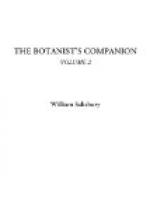344. Fumaria officinalis. Fumitory. The Leaves.—The medical effects of this herb are, to strengthen the tone of the bowels, gently loosen the belly, and promote the urinary and other natural secretions. It is principally recommended in melancholic, scorbutic, and cutaneous disorders; for opening obstructions of the viscera, attenuating and promoting the evacuations of viscid juices.
345. Galega officinalis. Goat’s rue. The Herb.—This is celebrated as an alexipharmic; but its sensible qualities discover no foundation for any virtues of this kind: the taste is merely leguminous; and in Italy (where it grows wild) it is said to be used as food.
346. Galium Aparine. Goosegrass, or cleavers. The Leaves.—It is recommended as an aperient, and in chronic eruptions; but practice has little regard to it.
347. Galium verum. Ladies bedstraw, or cheese-rennet. The Herb.—This herb has a subacid taste, with a very faint, not disagreeable smell: the juice changes blue vegetable infusions to a red colour, and coagulates milk, thus exhibiting marks of acidity. It stands recommended as a mild styptic, and in epilepsy; but has never been much in use.
348. Geranium robertianum. Herb Robert. The leaves.—They have an austere taste, and have hence been recommended as astringent: but they have long been disregarded in practice.
349. GLECHOMA hederacea. Ground-Ivy. The Leaves.—This herb is an useful corroborant, aperient, and detergent; and hence stands recommended against laxity, debility, and obstructions of the viscera: some have had a great opinion of it for cleansing and healing ulcers of the internal parts, even of the lungs; and for purifying the blood. It is customary to infuse the dried leaves in malt liquors, to which it readily imparts its virtues; a practice not to be commended, unless it is for the purpose of medicine.
350. Hedera helix. Ivy. The Leaves and Berries.—The leaves have very rarely been given internally; notwithstanding they are recommended (in the Ephem. natur. curios. vol. ii. obs. 120.) against the atrophy of children; their taste is nauseous, acrid, and bitter. Externally they have sometimes been employed for drying and healing ichorous sores, and likewise for keeping issues open. The berries were supposed by the ancients to have a purgative and emetic quality; later writers have recommended them in small doses, as diaphoretics and alexipharmics; and Mr. Boyle tells us, that in the London plague the powder of them was given with vinegar, with good success, as a sudorific. It is probable the virtue of the composition was rather owing to the vinegar than to the powder.
351. HERNIARIA glabra. RUPTUREWORT. The Leaves.—It is a very mild restringent, and may, in some degree, be serviceable in disorders proceeding from a weak flaccid state of the viscera: the virtue which it has been most celebrated for, it has little title to, that of curing hernias.




